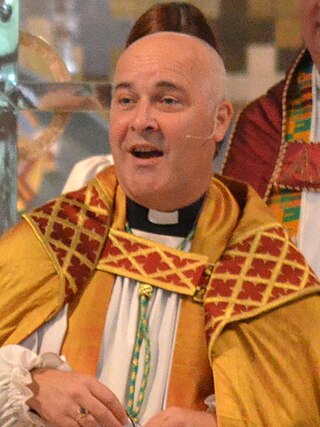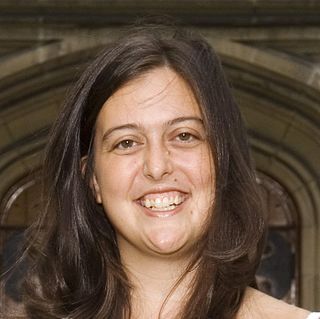
Messy Church is "a way of being church for families". Its slogan is "Church, but not as you know it". [1]

Messy Church is "a way of being church for families". Its slogan is "Church, but not as you know it". [1]
Messy Church began as a fresh expression of church in 2004 in the parish of Cowplain, near Portsmouth, England, [2] and as of February 2019 there were more than 2,800 Messy Churches registered in England. [3] [4]
By 2015, Messy Church had spread from the UK to other European countries and to Australia, New Zealand, Canada, the USA, and South America. [5] [6] It is supported and resourced by the Bible Reading Fellowship. [7]
The Christadelphians are a restorationist and nontrinitarian Christian denomination. The name means 'brothers and sisters in Christ', from the Greek words for Christ (Christos) and brothers (adelphoi).

The King James Version (KJV), also the King James Bible (KJB) and the Authorized Version (AV), is an Early Modern English translation of the Christian Bible for the Church of England, which was commissioned in 1604 and published in 1611, by sponsorship of King James VI and I. The 80 books of the King James Version include 39 books of the Old Testament, 14 books of Apocrypha, and the 27 books of the New Testament.
Methodism, also called the Methodist movement, is a Protestant Christian tradition whose origins, doctrine and practice derive from the life and teachings of John Wesley. George Whitefield and John's brother Charles Wesley were also significant early leaders in the movement. They were named Methodists for "the methodical way in which they carried out their Christian faith". Methodism originated as a revival movement within Anglicanism with roots in the Church of England in the 18th century and became a separate denomination after Wesley's death. The movement spread throughout the British Empire, the United States and beyond because of vigorous missionary work, and today has about 80 million adherents worldwide.

Unitarian Universalism is a liberal religious movement characterized by a "free and responsible search for truth and meaning". Unitarian Universalists assert no creed, but instead are unified by their shared search for spiritual growth. Unitarian Universalists do not have an official, unified corpus of sacred texts. Unitarian Universalist congregations include many atheists, agnostics, deists, and theists; there are churches, fellowships, congregations, and societies around the world.

Reformed Baptists, Particular Baptists and Calvinistic Baptists, are Baptists that hold to a Calvinist soteriology. Depending on the denomination, Calvinistic Baptists adhere to varying degrees of Reformed theology, ranging from simply embracing the Five Points of Calvinism, to accepting a modified form of federalism; all Calvinistic Baptists reject the classical Reformed teaching on infant baptism. While the Reformed Baptist confessions affirm views of the nature of baptism similar to those of the classical Reformed, they reject infants as the proper subjects of baptism. The first Calvinistic Baptist church was formed in the 1630s. The 1689 Baptist Confession of Faith is a significant summary of the beliefs of Reformed Baptists. The name "Reformed Baptist" dates from the latter part of the 20th century to denote Baptists who retained Baptist ecclesiology, and reaffirmed Reformed biblical theology, such as Covenant theology.

The New Revised Standard Version (NRSV) is a translation of the Bible in contemporary English. It was first published in 1989 by the National Council of Churches, the NRSV was created by an ecumenical committee of scholars "comprising about thirty members". The NRSV relies on recently published critical editions of the original Hebrew, Aramaic, and Greek texts. A major revision, the New Revised Standard Version Updated Edition (NRSVue), was released in 2021.

The English Standard Version (ESV) is a translation of the Bible in contemporary English. Published in 2001 by Crossway, the ESV was "created by a team of more than 100 leading evangelical scholars and pastors." The ESV relies on recently published critical editions of the original Hebrew, Aramaic, and Greek texts.

The Christian Methodist Episcopal Church (C.M.E.C.) is a Methodist denomination that is based in the United States. It adheres to Wesleyan-Arminian theology. Though historically a part of the black church, the Christian Methodist Episcopal church membership has evolved to include all racial backgrounds.
Religion in the United Kingdom is mainly expressed in Christianity, which dominated the land since the 7th century. Results of the 2021 Census for England and Wales showed that Christianity is the largest religion, followed by the non-religious, Islam, Hinduism, Sikhism, Judaism, Buddhism, and Taoism. Among Christians, Anglicanism is the most common denomination, followed by Catholicism, Presbyterianism, Methodism, Unitarianism, and Baptism. Results for the 2022 census in Scotland showed that 38.8% of the Scottish population identified as Christian, with 20.4% stating that the Church of Scotland is their main religion, whilst 13.3% stated their main religion was the Catholic church in Scotland.

The Anglican Church of Canada is the province of the Anglican Communion in Canada. The official French-language name is l'Église anglicane du Canada. In 2022, the Anglican Church counted 294,931 members on parish rolls in 1,978 congregations, organized into 1,498 parishes. The 2021 Canadian census counted 1,134,315 self-identified Anglicans, making the Anglican Church the third-largest Canadian church after the Catholic Church and the United Church of Canada.
John Barton is a British Anglican priest and biblical scholar. From 1991 to 2014, he was the Oriel and Laing Professor of the Interpretation of Holy Scripture at the University of Oxford and a Fellow of Oriel College. In addition to his academic career, he has been an ordained and serving priest in the Church of England since 1973.
The Free Church of Scotland is a conservative evangelical Calvinist denomination in Scotland. It is the continuation of the original Free Church of Scotland that remained outside the union with the United Presbyterian Church of Scotland in 1900, and remains a distinct Presbyterian denomination in Scotland.

Stephen Geoffrey Cottrell is a Church of England bishop. Since 9 July 2020, he has been the Archbishop of York and Primate of England; the second-most senior bishop of the church and the most senior in northern England. He previously served as Bishop of Reading, 2004–2010, and as Bishop of Chelmsford, 2010–2020.
Stephen John Hunt is a British professor of sociology at the University of the West of England. Prior to his appointment at the University of West England in 2001, Hunt had taught at the Sociology Department at the University of Reading for thirteen years, as well as in the Religious Studies Department at the University of Surrey, Roehampton.

Christianity is the prevalent religion in the United States. A Gallup survey from 2023 indicates that of the entire U.S. population about 67% is Christian. The majority of Christian Americans are Protestant Christians, though there are also significant numbers of American Roman Catholics and other Christian denominations such as Latter Day Saints, Eastern Orthodox Christians, Oriental Orthodox Christians, and Jehovah's Witnesses. The United States has the largest Christian population in the world and, more specifically, the largest Protestant population in the world, with nearly 210 million Christians and, as of 2021, over 140 million people affiliated with Protestant churches, although other countries have higher percentages of Christians among their populations. The Public Religion Research Institute's "2020 Census of American Religion", carried out between 2014 and 2020, showed that 70% of Americans identified as Christian during this seven-year interval. In a 2020 survey by the Pew Research Center, 65% of adults in the United States identified themselves as Christians. They were 75% in 2015, 70.6% in 2014, 78% in 2012, 81.6% in 2001, and 85% in 1990. About 62% of those polled claim to be members of a church congregation.
Conservative evangelicalism is a term used in the United Kingdom to describe a theological movement found within evangelical Protestantism. The term is used more often in this sense, but conservative evangelicals themselves tend to use it interchangeably and synonymously with evangelical. Conservative evangelicals are sometimes called fundamentalists, but they typically reject that label and are keen to maintain their distinct identity, which is more Reformed. Reformed fundamentalism shares many of the characteristics of conservative evangelicalism. In this sense, conservative evangelicalism can be thought of as distinct from liberal evangelicalism, open evangelicalism, and charismatic evangelicalism. Some conservative evangelical groups oppose the ordination of women as ministers or clergy and/or women holding leadership positions.
Richard Alan Burridge is a Church of England priest, biblical scholar and a former Dean of King's College London.
Maggi Eleanor Dawn is a British musician, author, theologian and Anglican priest. She was Principal of St Mary's College at the University of Durham, and remains a professor in the Department of Theology and Religion. Previously she was associate professor of Theology and Literature and Associate Dean of Marquand Chapel at Yale Divinity School.

Elizabeth Armen "Liz" Theoharis is an American theologian who is the co-chair of the Poor People's Campaign: A National Call for a Moral Revival, and the Director of the Kairos Center for Religions, Rights, and Social Justice at Union Theological Seminary. She is an ordained minister in the Presbyterian Church (USA).
Anne Frances Elvey is an Australian academic, editor, researcher and poet.